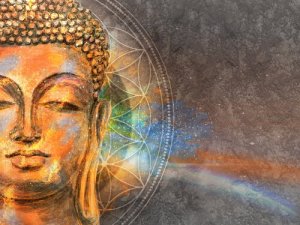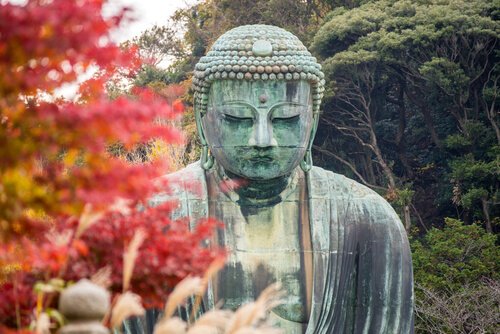Love According to Buddhism

Love according to Buddhism is much different than love according to the Western world. In Buddhism, it’s a pure feeling that you give unselfishly to another living being. It comes with a total feeling of comfort, knowing that you haven’t caused pain or suffering to anyone. Instead, you’ve helped bring them joy.
In the West, love is a two-sided concept that always involves another person, mutual feelings, and belonging. It’s two-sided because, even though on the one hand you have to have the other person’s acceptance, the other part focuses on you. What that means is that it’s a “less unselfish” kind of love.
There are two conflicting concepts here. In the words of Sigmund Freud, the object of love will seek protection, but they’ll also try to keep the love for themselves. That can make them a target for insults and attacks when they aren’t with their lover.
That happens because your life drives and death drives only exist thanks to each other. You can’t have love without hate. In the same way, according to psychoanalysis, the life drive tries to preserve things and keep them together, but it has a link to the death drive, which tries to destroy and separate them. In the end, they both feed into each other.
The main characteristics of love according to Buddhism
Love according to Buddhism is completely different from the idea we have in the West. For one thing, a basic characteristic of love according to Buddhism is the ability to feel compassion for the other person. This compassion is what would lead all living beings to receive respect.

The Buddhist idea of love also says that love should always come from the same place as faith. The goal is for it to be illuminating and to be able to eliminate the kind of suffering that’s very present in the Western idea of love. It’s a kind of genuine desire for the other person’s well-being where you share your energy and resources.
“If we believe in the continuity of mind, then love inconspicuously connects us to the ones we love with continuous positive energy, so that even tangible separations between people who love each other do not reduce the intangible power of love.“
-Thinley Norbu Rinpoche-
Friendship and benevolence as major parts of love
Love according to Buddhism also has a lot to do with friendship and benevolence. But these should never force you to attach yourself to the other person, which can lead to suffering. You don’t have to glue yourself to anyone to practice love according to Buddhism, because that’s impossible. Nothing stays in one place forever. Everything changes, everything transforms.
This religion says that you can only truly find happiness and fulfillment within yourself. You can only share these with other people from within yourself, but never completely. That’s because dependence is never a part of Buddhist philosophy.
Love according to Buddhism is unending, because the energy it gives you comes from the cosmos, and not from you as an individual. If the love doesn’t have all the characteristics we’ve already mentioned, Buddhism says that it’s just a selfish projection of your own needs.
“The teachings on love given by the Buddha are clear, scientific, and applicable… Love, compassion, joy, and equanimity are the very nature of an enlightened person. They are the four aspects of true love within ourselves and within everyone and everything.“
-Thich Nhat Hanh-

Another characteristic of true love is being happy for the other person. There should be no jealousy at all, just joy at the other person’s well-being. Love should also be balanced and equal so that it does not disrupt the soul and turn into dependence.
Seeing true love for another person from the Eastern point of view isn’t always easy. It can be hard to drop all the cultural baggage you’ve picked up since you were born. But making an effort to practice it is an amazing way to take advantage of everything you have to give.
Love according to Buddhism is much different than love according to the Western world. In Buddhism, it’s a pure feeling that you give unselfishly to another living being. It comes with a total feeling of comfort, knowing that you haven’t caused pain or suffering to anyone. Instead, you’ve helped bring them joy.
In the West, love is a two-sided concept that always involves another person, mutual feelings, and belonging. It’s two-sided because, even though on the one hand you have to have the other person’s acceptance, the other part focuses on you. What that means is that it’s a “less unselfish” kind of love.
There are two conflicting concepts here. In the words of Sigmund Freud, the object of love will seek protection, but they’ll also try to keep the love for themselves. That can make them a target for insults and attacks when they aren’t with their lover.
That happens because your life drives and death drives only exist thanks to each other. You can’t have love without hate. In the same way, according to psychoanalysis, the life drive tries to preserve things and keep them together, but it has a link to the death drive, which tries to destroy and separate them. In the end, they both feed into each other.
The main characteristics of love according to Buddhism
Love according to Buddhism is completely different from the idea we have in the West. For one thing, a basic characteristic of love according to Buddhism is the ability to feel compassion for the other person. This compassion is what would lead all living beings to receive respect.

The Buddhist idea of love also says that love should always come from the same place as faith. The goal is for it to be illuminating and to be able to eliminate the kind of suffering that’s very present in the Western idea of love. It’s a kind of genuine desire for the other person’s well-being where you share your energy and resources.
“If we believe in the continuity of mind, then love inconspicuously connects us to the ones we love with continuous positive energy, so that even tangible separations between people who love each other do not reduce the intangible power of love.“
-Thinley Norbu Rinpoche-
Friendship and benevolence as major parts of love
Love according to Buddhism also has a lot to do with friendship and benevolence. But these should never force you to attach yourself to the other person, which can lead to suffering. You don’t have to glue yourself to anyone to practice love according to Buddhism, because that’s impossible. Nothing stays in one place forever. Everything changes, everything transforms.
This religion says that you can only truly find happiness and fulfillment within yourself. You can only share these with other people from within yourself, but never completely. That’s because dependence is never a part of Buddhist philosophy.
Love according to Buddhism is unending, because the energy it gives you comes from the cosmos, and not from you as an individual. If the love doesn’t have all the characteristics we’ve already mentioned, Buddhism says that it’s just a selfish projection of your own needs.
“The teachings on love given by the Buddha are clear, scientific, and applicable… Love, compassion, joy, and equanimity are the very nature of an enlightened person. They are the four aspects of true love within ourselves and within everyone and everything.“
-Thich Nhat Hanh-

Another characteristic of true love is being happy for the other person. There should be no jealousy at all, just joy at the other person’s well-being. Love should also be balanced and equal so that it does not disrupt the soul and turn into dependence.
Seeing true love for another person from the Eastern point of view isn’t always easy. It can be hard to drop all the cultural baggage you’ve picked up since you were born. But making an effort to practice it is an amazing way to take advantage of everything you have to give.
This text is provided for informational purposes only and does not replace consultation with a professional. If in doubt, consult your specialist.







